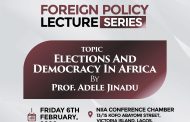By Ambassador Usman Sarki
Political stability does not fall from Heaven like manna or rain. It is brought about by perceptive deliberations regarding the organisation of society and the determined orientation of governance and statecraft towards achieving some set goals about the way people are brought under a civilised system of administration. Now, more than ever, Africa needs political certainty and stability in order to overcome decades of mismanagement of its fortunes and painful and regrettable experiences in maladministration. Therefore, the issue of governance is worth returning to again and again, especially in the context of the recurring instability in several countries in West Africa and the uncertainties surrounding the rest of the continent.

Models of governance if we look back
Governance literally underpins everything. Therefore, it becomes especially important that it should be considered as the ultimate activity in the vocation of politics and structuring of state institutions. It is also necessary that democracy as a means of acquiring or ceding power should be linked to governance and the way states are organised, so as to present us with the ultimate purpose of this form of popular activity. Electoral processes and how incumbents behave after coming into office play a significant role in how democracy is nurtured in Africa.
Constitutionalism and the observance of due processes in governance are predicated upon a sincere and honest appreciation of the various dimensions of statecraft and leadership, as well as their implications on the trajectory of political development in our various countries. A deep, sober and critical appraisal is therefore required, in the wake of the unconstitutional changes of power that have suddenly erupted in the West African region of late, spanning through Mali, Guinea and Burkina Faso, with attempted coup d’etats in Niger and Guinea-Bissau.
Chad and Sudan are two countries that are linked to the region by close historical, linguistic, cultural and religious ties which have also been afflicted by political instability although out of the regional structures of the West African region. These spates of military interventions in the governments of these countries are indeed matters for concern to all democrats although they should not be seen as mere aberrations that have cropped up as transient phenomena. They reflect deep and fundamental structural fault lines in the political and governance systems of these countries, with the insidious problems of underdevelopment and the failure to observe democratic practice.
One key area in which there has been little discussion or interest is the significance ultimately of conducting peaceful and transparent elections and the smooth handing over of power in African countries. It is therefore important that advocates and defenders of democracy should endeavour to provide a broad conceptualisation of the importance of peaceful conduct of elections in Africa, and the imperative for all actors to own up to their individual and collective responsibilities to ensure that elections are held under peaceful and transparent conditions. To some appreciable extent, Senegal has demonstrated unparalleled maturity in the conduct of elections and peaceful transition from one ruling party or group to another.
A cursory look at the African political scene will readily reveal that elections and peace and stability, and their other extremes of conflicts and polarisations and how to bring about the first and avert the latter, have become tremendously important concerns for the international community, and no less for the African Union (AU) and regional organisations like ECOWAS. It was no doubt in consideration of the significance of these factors that both the AU and ECOWAS established or created different mechanisms for dealing with elections and their aftermath in their member-states. Such charters and protocols are meant to establish the broad guidelines for action towards ensuring the integrity of democratic governance as well as the observance of elementary due processes that make for a better system of political organisation of our countries.
The adoption and observance of these regional and continental instruments underpin the importance with which elections are viewed, as well as the imperative of ensuring the conditions under which they are held which should remain matters of concern and interest to all Africans. The creation of statutory bodies were also deemed as means of shoring up good and effective governance frameworks in Africa. The establishment of the Pan-African Parliament, the African Peer Review Mechanism (APRM) and the New Partnership for Africa’s Development (NEPAD) for instance, was meant to provide a continental ombudsman system to guide and orient governments in Africa towards fulfilling their responsibilities under the African Union’s Constitutive Act.

Is it scarcity of honest brokers that is part of the problem?
Other mechanisms or treaty bodies like the African Commission for Human and People’s Rights and the African Court of Human and People’s Rights, have been established to ensure the prerogatives and rights of the African peoples are maintained and advanced as and whenever required. These are considered as parts of the African Governance Architecture (AGA) which is a framework established to lead towards the effective realisation of the African Union’s Shared Values principles adopted in 2011 to firm up the normative and practical structures for deepening democratic governance in Africa.
The Shared Values principles consist of core values such as the right to life and dignity of the African person, the right to freedoms, the right to justice and equality before the law, the right to vote and be voted for, the right to participate and be represented in government, and all the basic necessities that make for a wholesome democratic system in our countries. All these are underlined by the right to vote in free and fair exercise of selecting leaders to man the democratic institutions of a country. Elections are important because they are the only means albeit indirectly of participation in government for billions of people around the world, as such they should be considered as the strongest pillar of our democracy.
 If their exercise and conduct are vitiated or rendered inconsequential either by commission or by omission, a great deal of disservice would be done to us all. The extent to which elections can be said to have empowered the people is also an issue whose veracity would need to be interrogated closely. If elections are the means by which people are empowered to have a say in how their lives are shaped, their futures are formed, and their destinies are determined, then empirical evidence should always be searched for and provided to buttress such a supposition. Perhaps one of the responsibilities of political parties in Africa should be to provide such evidence to justify why Africans should repose their hopes in democracy, and their trust in the political parties.
If their exercise and conduct are vitiated or rendered inconsequential either by commission or by omission, a great deal of disservice would be done to us all. The extent to which elections can be said to have empowered the people is also an issue whose veracity would need to be interrogated closely. If elections are the means by which people are empowered to have a say in how their lives are shaped, their futures are formed, and their destinies are determined, then empirical evidence should always be searched for and provided to buttress such a supposition. Perhaps one of the responsibilities of political parties in Africa should be to provide such evidence to justify why Africans should repose their hopes in democracy, and their trust in the political parties.
However, the reality in most of Africa is that the significance of elections begins and end at the ballot box if ever they are held in transparent and tranquil conditions. This negative perception has undermined the credibility of most elections and continues to introduce contentions about their outcomes, especially between the parties in power and those in opposition. A state of stalemate always seems to follow elections in most African countries, with bitter disputes about their legitimacy and transparency forming the points of contention rather than the processes that brought about the exercises in the first place. In this way the integrity of elections are called into question thereby providing ready excuses to those who wish to subvert democratic governance and appropriate the political spaces for themselves through means other than those recognised by their constitutions and other legal frameworks.
For this reason, elections are seen by some as mere exercises in periodically endorsing candidates or political parties for offices, while many others believe that they do not result in situations where the people are actually in the lead in the process of governance and particularly in the distribution and allocation of power, resources and responsibilities. Elections that do not produce inclusiveness across social divides and economic blocs, will always remain mere matters of form rather than of substance. To achieve a substantially advantageous election system or process, the end results should matter more than the initial processes and procedures although these also matter a great deal.
If elections are indeed the mechanism by which people’s preferences are expressed, and their choices of who comes into office are manifested in the exercise, they should ultimately result in beneficial spinoffs for the people in terms of improvements in their lives and changes in their general circumstances. Once this end is realised, one of the key secrets of stability and progress would have been unlocked in Africa. Where however the democratic process is restricted to the ordinary exercise of casting the ballot and nothing more beyond that, the exercise will be rendered meaningless ultimately, and alienation will ensue subsequently. In this respect, it is necessary that in Africa we should become imbued with the sense of importance of our ballots and determines how such exercises are not only conducted but concluded.
Likewise, we should recognise the necessity of determining whether elections are the sole mode of expression of a democratic rule or whether other factors could be admitted as relevant in such a consideration. One critical element therefore that we should consider in this respect is the conditions under which elections are held in our countries. Elections that are preceded or followed by violence, general malpractices and manipulations, unwarranted state interference, manifest lack of independence of the entire process and of course, media bias, undemocratically chosen candidates, closed system of primaries, and various other shortcomings, will undoubtedly overshadow and even eclipse the credibility of the entire process.
These will in turn result in instability and serious complications for both the government and the country concerned. The litigations that follow such processes will also bring about polarisation and the needless exposure of the country’s judicial system to various ills and stresses. The contemporary political scene in Africa is sadly replete with the above described conditions. Many countries have found themselves in chaos and division induced by various types of election related malpractices, violence and mayhem. In many countries across Africa, elections are viewed as life and death struggles, and the only means of occasionally deciding who comes to power with the expectations of immediate rewards to the people in one camp or the other.
In situations where invariably one side loses, the aggrieved persons or groups are left with no alternative but to resort to desperate actions that also undermine peace and tranquility, thus setting off a viscous cycle of tempestuous violence and recurring destructiveness. The ensuing law and order problems will then be compounded by the claims and counter-claims of irregularities and challenges of the legitimacy of the entire process, thus setting off a chain reaction of instability and endless divisions in the country. Such situations will of course invite other interests to jump into the fry and occupy any vacuum created by dissension and antagonistic tendencies.
The apparent absence of an impartial system of appeal or recourse for redress in situations where grievances have arisen around elections, has also led to the creation of instability in many African countries. Where the power of the incumbent party or leader is almost unassailable by any means, a sense of hopelessness is created that arouses indignation as well as desperation, thus giving room for the emergence of a feeling of victimisation and alienation, which in turn creates an air of restiveness all around the country. The responsible use of the power of incumbency, and the observance of the due restraints of constitutional rule, should avert all problems and ensure that inclusiveness and proprieties are respected.
Opening up of the political space to as many organised participants as possible is another way of bringing about inclusiveness and a sense of ownership of the electoral process. Restrictions imposed by law or fiat that prevent others from partaking in the electoral process will be recipes for disaster and an invitation to growing discontent. This becomes a poignant reality in almost all African countries where there are very limited options open to many people particularly those from ethnic minorities, poor people and the underprivileged, whose participation in the governance and political processes in their countries are often marginal or peripheral.
Without accessible appeals mechanisms that are available to the aggrieved persons or groups, the electoral processes will become mere exercises in observance of the forms of democracy without imbibing its spirit of inclusivity and accommodation of different tendencies and opinions. To avert such outcomes the space should be opened DOR civil society and the diverse groupings that form the National outlook particularly those representing of the diverse professions, age and gender clusters.
The need for peaceful, credible and transparent elections must therefore, be of singular importance to all Africans if deeper crisis is to be exerted and perpetual instability is to be overcome in our countries. Since democracy has become a global norm through the force of practice and general popular perception, its observance and entrenchment in our continent should become a matter of the utmost priority not just as a momentary expedience but as a matter of long term and continuous exemplification of our ability to take our destinies into our own hands.
The author was Nigeria’s Deputy Permanent Representative to the United Nations, New York




























